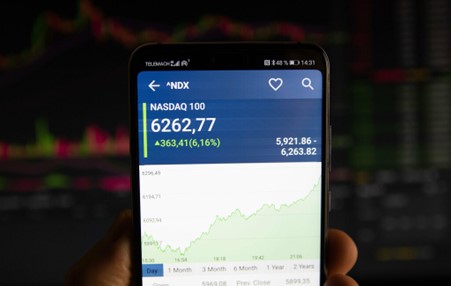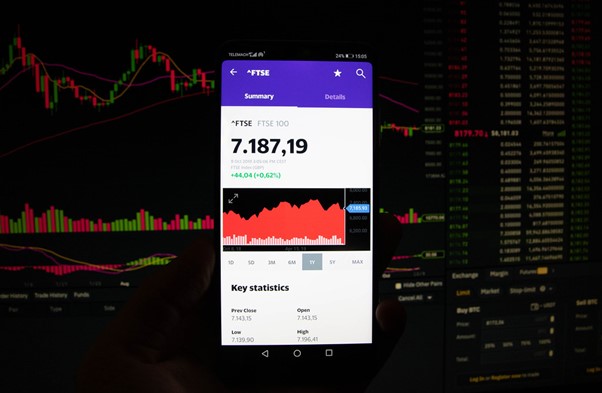Stock trading involves the frequent buying and selling of stocks to take advantage of small price changes. While stock trading offers numerous exciting opportunities, there are thousands of listed companies around the world. If a trader wants a mixed portfolio of stocks they will need to track each individual stock, the performance of each of the companies, changes in the industries in which these companies operate and a host of other factors that may cause their prices to fluctuate. If you don’t have that kind of time or knowledge you can still gain exposure to a wider range of stocks by trading stock indices.
Stock indices can be traded like individual stocks to gain exposure to a sector or the economy as a whole. You can also trade stock indices with Contracts for Difference (CFDs).
What are Stock Indices?
A stock index is a collation of shares of different companies. Stock indices usually comprise of a predetermined number of the top shares from a given exchange. Some stock indices include stocks from a specific sector. For instance, the Nasdaq 100 comprises of the top 100 companies from the tech sector.
On the other hand, there are stock indices like the S&P 500, which are comprised of stocks across a number of industries.
How are Stock Market Indices Constructed?
Stock market indices are constructed based on the weightage of the component stocks. While most stock indices are constructed based on the market capitalisation of each company, there are some that are price-weighted or equal-weighted.
- Market-cap weighted: In these, the large-cap stocks determine the performance of the stock indices. These are widely popular as the overall market performance also depends on large-cap stocks to a great extent.
- Price weighted: The price-weighted stock indices assign a certain weightage to each of the stocks in the index as per the current market price. Thus, the stocks that have higher prices make more of an impact on the performance of the index, irrespective of whether the company is big or small in terms of its market capitalisation.
- Equal weighted: In these indices, all the stocks affect the performance of the indices equally, whether they are large-cap, mid-cap or small-cap or have higher or lower prices.
What Moves the Price of Stock Indices?
There are quite a number of factors that can affect the price of an index. These include:
- Economic news: News related to central bank announcements, the release of economic data (like GDP growth, payrolls, retail sales, etc.) and major economic events (like the pandemic-related restrictions, supply chain disruptions, etc.)
- Geopolitical news: News of elections, changes in the government and conflict between nations can also have a significant impact on stock indices.
- Overall sentiment: The overall market sentiment has a significant impact on stock indices. Optimism around economic growth or the prospects of a particular industry can send stock indices higher.
- Company news or announcements: The overall financial results of the companies, major announcements like change of top management or mergers and acquisitions, launch of new products or the approval of patents can have a significant impact on stock indices, especially when these are related to companies with larger market capitalization.
Different Ways of Trading Stock Indices
Most traders trade stock indices using CFDs, or Contracts for Difference, which allows you to gain exposure to price movements without actually owning any assets. Using CFDs, a trader can trade cash indices or futures.
Cash Indices
Cash indices are suitable for traders who wish to trade stock indices for the short-term with lower spreads. This is because cash indices are traded at spot prices, which tend to have tighter spreads.
How to Trade Cash Indices?
If you expect the price of an index to rise, you can buy a CFD for the index. This is known as ‘going long’. If, instead, you expect the price to fall, you can short sell or ‘go short’. Thus, with CFDs, you can identify trading opportunities whether the stock indices are rising or falling.
Index Futures
These are derivative contracts to buy or sell an index to be settled at a future date at a set price.
How to Trade Index Futures?
Similar to trading cash indices, if you believe the price of the index will rise, you can ‘go long’ on the index futures using CFDs, or ‘go short’ in case you expect the price to decline. For instance, if you expect the price of the S&P 500 to rise from $3,857 to $3,900 over the next 3 days, you can go long on S&P 500 futures contracts with CFDs.
Popular Stock Indices Around the World
The most popular stock indices worldwide are:

Image Source: https://upload.wikimedia.org/wikipedia/commons/5/59/Wall_Street_Sign.jpg
DJIA (DJ30)
This comprises of 30 large stocks trading on the NYSE and Nasdaq stock exchanges. Despite its full name being the Dow Jones Industrial Average, the index is no longer considered a proxy for industrials. This is because only a few companies now are from the industrials segment. The constituents of the DJ30 are blue-chip companies, including leading names like American Express, Apple, 3M, Boeing, and Chevron.
S&P 500 (SP 500)
This tracks 500 leading companies in the US market as per their market capitalisation. It covers almost 11 sectors and around 80% of the total market capitalisation of the US stock exchanges. Some of the most traded stocks included in the S&P500 are Apple, Microsoft, Amazon, Berkshire Hathaway, and Johnson & Johnson.

Image Source: https://live.staticflickr.com/7921/46449467772_50f210c2bf_b.jpg
Nasdaq 100 (NAS100)
This includes 100 of the leading stocks in the US technology sector. Some of the top companies in the Nasdaq100 are Apple, Microsoft, Amazon, Alphabet and Tesla.
STOXX Europe 50 (EU50)
This stock index tracks 50 of the most prominent bluechip stocks from the Eurozone. Initiated and maintained by Deutsche Börse Group, the EU50 has been dominated by stocks from France and Germany. In April 2021, more than a third of the index comprised of leading French companies, while top German companies comprised of another third of the index. Some of the most notable companies included in this index are ASML Holding,
LVMH, Linde, SAP, Sanofi, Siemens, Total and L’Oréal.
DAX40
This comprises of 40 companies from Germany. It was earlier known as the DAX30 or Germany 30 because it comprised of only 30 stocks. The index was expanded in the third quarter of 2021 and now tracks 40 top stocks listed on the Frankfurt Stock Exchange (FSE). Among the most popular stocks in this index are Linde, Allianz, Siemens, Mercedes Benz Group and Volkswagen.
CAC40 (FRA40)
This tracks 40 stocks that trade on the Euronext Paris stock exchange. It comprises leading French companies, like Airbus, L’Oréal, Sanofi, BNP Paribas and TotalEnergies.

Image source: https://live.staticflickr.com/65535/48903340862_59d5d77e4d_b.jpg
FTSE 100
This index tracks 100 large-cap, blue-chip companies in the UK, which are listed on the London Stock Exchange. FTSE stands for Financial Times Stock Exchange (FTSE) and the index includes leading UK companies like Royal Dutch Shell, AstraZeneca, BHP Group, Unilever and HSBC Holdings.
ASX/SPI 200 (SPI200)
This is an Australian stock index, which tracks the top 200 stocks listed on the Australian Securities Exchange in Sydney, as per market capitalisation. It was developed in 2000 and is maintained by Standard & Poor’s. In March 2022, the ASX had an average monthly turnover of 52 million trades . Some of the top stocks in this index are Commonwealth Bank, Westpac Banking, BHP Billiton, ANZ Banking Group, National Australia Bank, CSL Limited and Macquarie Group.
FTSE China A50 (China50)
This stock index tracks 50 stocks listed on the Shanghai and Shenzhen Stock Exchanges of China. FTSE Russell introduced it to track the performance of A-listed companies in China and to provide an efficient benchmark for those seeking exposure to the world’s second largest economy. In September 2022, China’s stock markets hit a record daily turnover exceeding 1 trillion yuan for 44 consecutive days. Some of the leading stocks that are part of this index are Kweichow Moutai, ICBC, China Construction Bank, Agricultural Bank China, China Merchants Bank, Bank of China, China Petrol and Midea Group.
Nikkei 225
Nikkei 225 is the most popular stock index from Japan. It is a price-weighted stock index that is constituted of 225 blue-chip companies that trade on the Tokyo Stock Exchange. Some of the top stocks in this index are Sony, Nissan Motor Company, Canon, Honda Motor and Hitachi Construction Machinery.
Hang Seng China 50 Index (HK50)
This index tracks the stocks of 50 leading companies listed on the Hong Kong Stock Exchange. There are several Chinese companies that are included in this index, as these are also listed on the Hong Kong Stock Exchange. Some of the leading constituents of this index are Alibaba, Industrial and Commercial Bank of China, China Construction Bank, Tencent, and Meituan.
Nifty 50 (India50)
This index is the flagship benchmark of India’s National Stock Exchange (NSE). It comprises 50 of the topmost companies in the country from various industries, which is why investors often use this index to diversify their portfolios. Some of the constituents with the highest traded prices of this index are Shree Cements, Nestle India, Bajaj Finserv, Maruti Suzuki
And UltraTech Cement.
Spain 35 (IBEX 35 or ES35)
This index tracks 35 leading stocks that are listed on the Spain Stock Exchange. The constituents of this index are some of the most liquid stocks in the country and they are included as per their market capitalisation. Some of the most popular constituents of this index are Repsol, IAG, Merlin Properties, Viscofan and Indra Sistemas.
South Africa 40 (FTSE/JSE Top 40 or SA40)
This index comprises of 40 of the largest companies from South Africa. The stocks are listed by investable market value. Some of the most prominent names in this index are Naspers, British American Tobacco, Kumba Iron Ore, Sasol and AngloGold Ashanti.
Apart from these frequently traded stock indices, there is one that is indirectly based on stocks but deserves a mention. The Cboe Volatility Index (VIX) is derived from the S&P 500 or SP500 options with near-term expiration dates. Since it represents the market’s current expectations for price changes of the SP500 index, it is considered a prediction of volatility over the next 30 days.
How to Read Stock Indices?
Changes in stock indices are often mentioned in “points.” However, this may mean different things for different indices, depending on their current value. For instance, if an index rises by 10 points while another rises by 30, it may seem that the latter has performed better. However, to read these indices, you need to check their opening points. The former may have opened at 200. This means the 10 points increase is a change of 5% (10/200*100). On the other hand, the latter may have opened at 3000. This means the 30 points increase is a change of only 1% (30/3000*100).
You can use the same technical indicators as you may have been using for analysing individual stocks.
Why Trade Indices?
There are different reasons for which traders begin indices trading. Some of the most common are:
- Easy Diversification: With stock indices, you can gain exposure to global stock markets. You can gain exposure to markets around the world without having to buy individual stocks from different countries. By choosing correctly, you can gain exposure to the overall economy or a specific sector by trading just one index.
- Less volatile than stocks: Since indices include a large number of stocks, they tend to be less volatile than individual stocks.
- Hedging existing positions: Experienced traders often use indices to hedge their existing portfolios. For instance, if a trader has certain stocks in the portfolio that are a part of the DJ30, they can limit downside risk by going short on the index.
Stock indices offer a simplicity of trading that go beyond what individual stocks can offer. By opening a single position, you gain access to a wider pool of industry sectors and global economies.
Start trading Stock Indices with Vantage.


